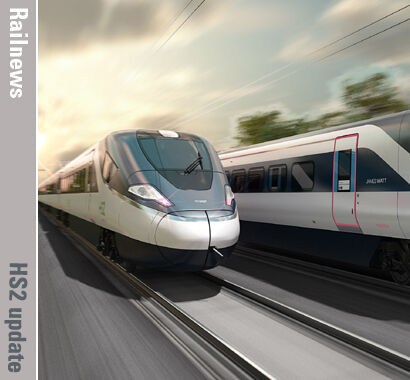The cancellation of the Northern leg of HS2 almost a year ago was caused by a combination of political factors, according to a report by the Institution of Civil Engineers.
After Phases 2A and 2B to Crewe and Manchester were cancelled by former Prime Minister Rishi Sunak last October, the ICE launched a ‘Next Steps Programme’ in April in a bid to analyse what had gone wrong with the project, which has also lost its Eastern Leg to the East Midlands and Yorkshire.
Work is continuing on Phase 1 between London and Birmingham, but even part of this Phase remains in doubt, because it is not clear whether high speed trains will ever go beyond Old Oak Common in west London to reach Euston.
The ICE has concluded that politicians were to blame for the spiralling costs, rather than engineers or the construction industry. It says: ‘It is not possible to separate politics from major infrastructure projects’.
The Labour government stands accused of ‘rushing’ the initial planning, so that HS2 Ltd could be set up before the 2010 general election. There was a bid to get political support, so that tunnels were lengthened to reduce the impact of the new railway without considering the costs and benefits.
Once set up, there was too much turnover in leadership at HS2 Ltd, with the result that significant decisions were ‘dumped’ by the new managers, who did not appreciate the implications.
The report says: ‘The personnel changes … meant that intended future decisions, not made but tacitly understood, would have been lost. One example is the expectation that HS2 would use standardised designs for bridges: this was not followed through in procurement decisions, with huge cost implications.’
It adds: ‘What has been achieved so far on Phase 1 demonstrates the civil engineering and construction capability in the UK to deliver a project of this scale. HS2 has driven innovation in delivery practices, including pioneering ways to reduce the impacts of large-scale infrastructure projects.’
Recommendations include that the benefits of projects must be clearly defined and communicated so there’s clarity and consistency about the project’s purpose for politicians and decision-makers, media, and the public. In the case of HS2, the lack of clear transport objectives meant the strategic need was not clear.
It is also essential to make clear who is in charge. The ICE says: ‘Clarity about how decisions are made, who makes them, and when, is essential. Corporate governance and technical understanding in sponsoring government departments should be improved to help with decision-making. In the case of HS2, steps should have been taken to protect institutional memory as the project progressed. Important knowledge was lost when people moved on to other roles.’
A further recommendation is that contracts need to be based on mature designs rather than concepts, and sufficient time is needed to assess different options and make sure that the choices are in line with the best practice. In the case of HS2 a standardised design could have been used for things like bridges, which would have helped to keep costs down, but this was not clearly agreed in the development process.
The ICE’s trustee for policy and external affairs Jonathan Spruce said: ‘The cancellation of HS2’s Northern leg exemplifies how impossible it is to separate major infrastructure projects from politics. To succeed and deliver desired outcomes, projects like HS2 require commitment that spans parties and political cycles. The number one lesson is that governments need to think long-term, select and prioritise projects based on strategic needs, and follow through. Getting it right improves people’s lives.’
C.K. Mak, who is an Honorary Professor in the Civil Engineering Department at the University of Hong Kong, chaired the paper’s steering group. He said: ‘Political and public support for infrastructure projects is more important than ever. Understanding why a flagship project like HS2 failed and what needs to be done differently is relevant not just for the UK, but for governments all over the world.’


